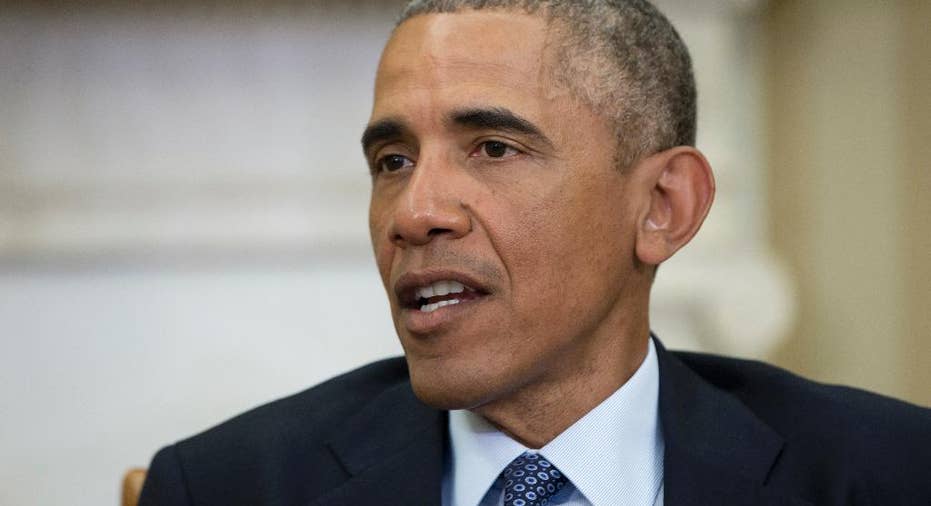Once cautious in promoting the recovery, Obama now a full-throated cheerleader

WASHINGTON – For most of last year, President Barack Obama tempered his pitch on the economy: It may be improving, he would say, but millions of Americans had yet to benefit from the rebound.
But now that caveat is gone, replaced by a bullish new message as Obama marches into his second-to-last year. "American resurgence is real," he says. "Don't let anybody tell you otherwise."
Despite multiple signs the recovery is indeed taking hold, some are saying otherwise, from conservatives to liberals in the president's own Democratic Party who point to stagnant wages and a yawning income gap between rich and poor. The clashing messages reflect Obama's need to boost his economic credentials and establish a post-recession legacy, and the desire by lawmakers to push their divergent economic policies.
Obama's retooled message, which he is unfurling as he approaches his Jan. 20 State of the Union address, comes as the public begins to warm toward the economy. An AP-GfK poll last month found negative perceptions of the economy overall are down compared with four years ago, with 57 percent describing it as "poor" compared with 83 percent who did in November 2010.
The new tone was evident last week during trips to Michigan, Arizona and Tennessee, where he touted the government bailout of the auto industry, unveiled new housing measures and called for free community college. This week, he is focusing on information technology and cybersecurity with events in Washington and Iowa.
For Obama, the idea of changing his tone on the economy gelled after the November midterm election, aides say. So in the two weeks in December before leaving for a Hawaii vacation, he huddled with his economic team to begin outlining themes for his Jan. 20 State of the Union address and recast his rhetoric.
His audience, aides say, is the two-thirds of voters who were too disgruntled to cast ballots in November.
"They need to understand that there are reasons to be optimistic, that there is true, tangible, solid growth and that we believe it's going to portend good things," White House communications director Jennifer Palmieri said in an interview.
Some White House allies say there is a risk Obama's new message won't resonate, or may even backfire, if he doesn't acknowledge many Americans are still struggling.
"He's got to paint a picture of why there are continued problems and what can be done about it," said Lawrence Mishel, an economist and president of the liberal-leaning Economic Policy Institute.
But White House officials no longer worry that optimistic assessments of the economy will seem tin-eared or that bright economic news will sour; concerns they still felt after encouraging first quarters in 2010, 2011 and even 2012.
"It's still a very dynamic situation and there's still concern that on any given day indicators can go in a different direction," Palmieri said. "But now it feels like you largely have some solid ground beneath you."
That solid ground includes a 5.6 unemployment rate for December, the lowest since 2008. Employers added 252,000 jobs in December, a healthy gain that contributed to 2014 being the best year for hiring in 15 years. The average price of gas in the United States is $2.20 per gallon, the lowest since May 2009. While the stock market has fizzled some in the past few days because of slumping oil prices, the Dow Jones industrial average set a record high by closing at 18,053 the day after Christmas.
White House officials also point to the Gallup Economic Confidence Index, which moved into positive territory last week for the first time since 2007.
How much of the credit Obama deserves is a matter of debate. Economies rise and fall because of numerous factors, not all driven by government policies. But in recent days, Obama has been touting his administration's 2009 stimulus plan, the bailout of the auto industry, his health care law and new financial regulations as key factors in the comeback. Yet another key player has been the independent Federal Reserve Bank, which has kept its benchmark interest rate near zero for six years and primed the economy by buying up trillions of dollars in government and private sector bonds.
Still, weaknesses remain. Nearly 7 million people are working part-time but would prefer full-time work. Participation in the labor force has dropped to a low of 62.7 percent. While some of that reflects the retirement of baby boomers, it also reflects the fact that many out-of-work Americans have given up looking for jobs.
Republican House Speaker John Boehner on Thursday said the economy is improving "a bit, but most Americans aren't seeing it."
On that point, he doesn't get much of an argument from liberal Democratic Sen. Elizabeth Warren of Massachusetts.
"For tens of millions of working families who are the backbone of this country, this economy isn't working," she told the AFL-CIO last week. "These families are working harder than ever, but they can't get ahead. Opportunity is slipping away."
Central to Warren's case are stagnant wages. Wages rose only 1.7 percent in 2014, hardly above the 1.3 percent inflation rate. Wages, however, have been flat or have declined for decades, and their immobility is not simply associated with the current recovery.
Still, Palmieri said Obama hasn't abandoned his commitment to tackle stagnant wages.
"That's what's left undone, right?" she said. "The president has been clear that is what the next two years are about."



















